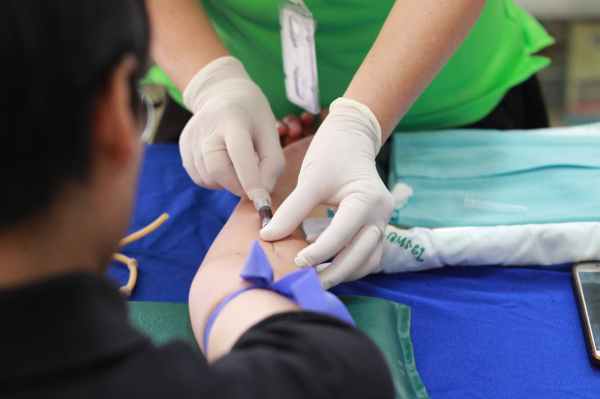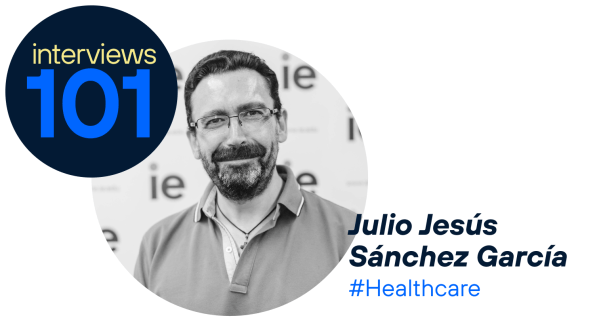Ángel Martín talks to us about mental health on Telefónica’s LinkedIn
Author, comedian and presenter Ángel Martín reflects with Víctor Aguado, Research and Brand Positioning Manager at Telefónica, on mental health and human connections in a live chat on our corporate LinkedIn channel.
How he lived through the psychotic break
Martin explains that, until he left the hospital after suffering a psychotic break, he didn’t know what had happened. “During the outbreak you are not aware of what is happening to you, you are celebrating having discovered the truth behind the universe.”
“At no point do you consider that something might be going wrong,” he adds, since ‘you live by a different set of rules than other people,’ although ”you start to be aware that something has happened inside your head when you leave the hospital.”
He recognizes the importance of having a close circle to lean on in situations like this, although Martín considers it more important that the aforementioned circle knows what to do and that it is not “toxic to the point of saying enough and sinking you even deeper”.
Understanding that “you are going to fall several more times” is for the comedian and presenter one of the tips when facing similar situations. “Having certain relapses is part of the process” to get out of it, he concludes.
Recovery process
Although each person manages it in a particular way, the first thing he did was “stop trying to rebuild the guy I thought I had been”, since “emotions are reset to zero” after an admission for saying things and having feelings that are not real.
Faced with this situation, the presenter asks himself at what point his perceptions have ceased to be real. Likewise, he assures that he does not feel the same way about things as he did before the outbreak.
In the process of recovery, he places a “millimetric attention” to his emotions, becoming his own priority to overcome a process that, he admits, “is very tiring because it takes time”. For this reason, he considers “being coherent with the emotions you have” to be common sense.
‘Por si las voces vuelven’ and ‘Detrás del ruido’
About his books ‘Por si las voces vuelven’ and ‘Detrás del ruido’, in which Martín reflects his experience with mental health, he explains that they arose from his famous “morning news to save time” with which he concisely exposes the main current affairs on a daily basis, a news format that emerged on Twitter and that he now also publishes on other social networks.
However, the humorist initially rejected the proposal of the publisher to write on this topic, although it served him to propose to capture in a publication his life experience and hospitalization after the psychotic break.
“I’m going to write the book that I didn’t find, in case someone could use it”, Martin summarizes what he thought after meditating on the proposal, being this the origin of ‘Por si las voces vuelven’ (In case the voices come back).
On the other hand, he places the genesis of ‘Detrás del ruido’ in the recurring question of how to do so that what happened is not repeated, which is why he decided to make “a guided tour” inside his head about how he understands being alive.
The comedian has become one of the people in the public sphere, such as athletes Simone Biles or Ricky Rubio, who have spoken openly about problems of this nature.
What is mental health?
Mental health is defined, according to the WHO (World Health Organization) as “a state of mental well-being that enables people to cope with life’s stressful moments, to develop all their abilities, to learn and work well, and to integrate into their environment”.
The organization itself explains that there are a number of factors – individual, environmental, family or structural – that either protect or undermine mental health. Adverse issues such as poverty, violence, inequalities or disabilities can increase the risk of suffering from such problems.
The WHO warns that those suffering from severe mental health disorders die, on average, between 10 and 20 years earlier than the general population, and that these conditions increase both the risk of suicide and the risk of suffering human rights violations.
This institution also emphasizes that mental health problems can affect all areas of life, including family relationships, friendships and the social environment in general.
Mental Health Day
World Mental Health Day has been celebrated every October 10 since 1992 to bring mental health issues closer together around the world.
In this year’s edition 2024, the focus is on prioritizing this issue in the workplace, in accordance with the guidelines of the World Federation for Mental Health (WFMH).
The campaign seeks to raise awareness of the importance of mental health in the professional environment in which it is protected, prioritized and promoted.










